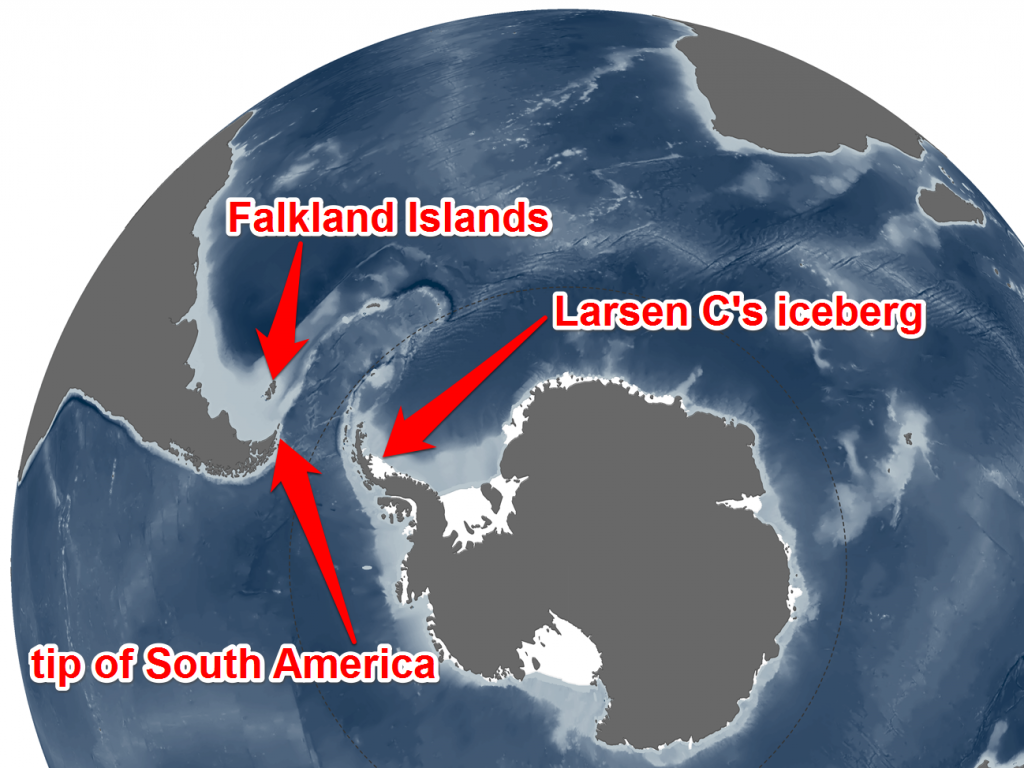Adrian Luckman and Martin O’Leary, glaciologists at Swansea University in Wales, note the new iceberg will likely be named “A68,” and that its enormous size makes its fate difficult to predict.
It may remain in one piece but is more likely to break into fragments,” he [Luckman] said. “Some of the ice may remain in the area for decades, while parts of the iceberg may drift north into warmer waters.”
Just how big is A68? It’s estimated to weigh 1.1 trillion tons, to be roughly the size of Delaware and have the volume of Lake Erie. It’s a beast.
The calving of this iceberg leaves the Larsen C Ice Shelf reduced in area by more than 12%, and the landscape of the Antarctic Peninsula changed forever.”
In terms of a destination, Anna Hogg, a glaciologist at the University of Leeds in England, speculates that ocean currents could drag the iceberg north, “even as far as the Falkland Islands.”
The Falkland Islands are a British territory just east of the Patagonian section of Argentina. They are more than a 1,000 miles north of the Larsen Ice Shelf.
Brigham Young University in Utah has a data project to track all recorded icebergs. The data, which has been recorded since 1999, provides some sense of what might happen with A68.
Many icebergs that break off the Antarctic Peninsula drift north and east of that location. Few are large enough to stay intact until they reach the warmer waters of the Falkland Islands, but many reach the South Georgia and South Sandwich Islands, which lie farther east.”
Luckman believes as A68 wanders into warmer ocean waters it will eventually melt away and pose no real threat to land.
Thankfully, this won’t contribute much to rising waters, since the ice “was already floating before it calved away,” he said, and thus “has no immediate impact on sea level.”
Despite the reassuring words of noted glaciologists, we surely can count on the thumb-sucking, bed-wetting climate doomsayers to sound the alarm of impending disaster. A Hollyweird movie can’t be far behind. Perhaps we’ll get lucky and a North Korean ICBM will go astray and hit A68.
From the video below, Professor David Vaughn states that there is “no evidence” that climate change is causing Antarctica to “break up”.
Source: Business Insider


You’ll notice that each and every time this ice breaks off from the Antarctic shelf, it’s always reported as being the size of Delaware. Weird, right? Not really. In fact, the reason why it’s always the same size is because that’s about the size it will be when it’s heavy and large enough to break off when there’s no more land beneath it to support it. You see, the glaciers inland in Antarctic (yes, it’s all land beneath that ice) will continue to grow and move outward toward the continental shelf. They will push outward for only so long as they can be supported. Eventually, the weight of it breaks off, because there’s nothing beneath it to support it. Happens all the time. It’s completely normal. You’ll never hear this happening in the north as the Arctic ice is not sitting on land, but on the ocean. Sometimes, large chunks break off, but by meters, not miles. It’s just common sense, but they’ll just yell Global Warming, as usual.
Ice doesn’t weaken with time. In fact, if under pressure it will get denser and stronger as air bubbles are pushed out.
I heard a climate scientist on the radio when they asked him why this happened and if it was related to global warming and he said no this is just what iceshelves do, they grow so big get so heavy break off and make icebergs. He said the rapid expansion of the ice over the last few years has caused the grow so big that it broke off.